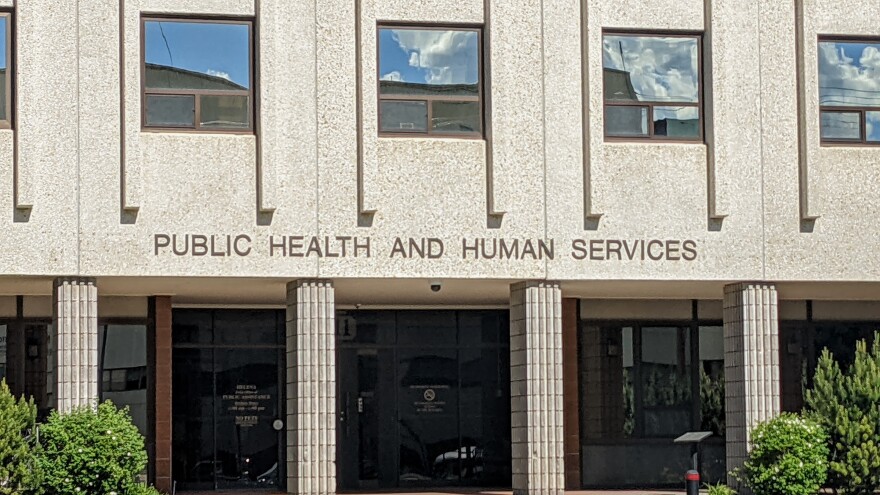The Montana Health Department hired a New York based consulting firm to guide the state as it undergoes a multiyear overhaul of its behavioral health services. The Montana Free Press first reported that the deal calls for payouts of up to $632 per hour for the firm's employees. Montana Free Press reporter Mara Silvers joined MTPR's Austin Amestoy with details.
Austin Amestoy: Mara, through a public records request, you dug up info on some pretty eye watering hourly rates the state will be paying employees of this consulting firm Alvarez and Marsal anywhere between $460 and $632 per hour. What kind of work will this firm be doing?
Mara Silvers: Yeah, I think that's a question on a lot of people's minds right now. So essentially, Alvarez and Marsal will be overseeing several different reform efforts that the Gianforte administration has launched to try to fix mental health services, addiction treatment and services for people with developmental disabilities. Some of the big aims include trying to get more federal funding to certain services and health care delivery systems in Montana and then to also make sure that Montana is doing everything it can from a policy perspective and from a funding perspective to keep those services alive and well functioning for years to come. So one of the big new elements here, one of the pieces in this contract is overseeing the work of the behavioral health systems for Future Generations Commission. Quite a mouthful, I know, but it's an important group. It's a group of lawmakers and governor appointees that have this pot of $300 million to spend on infrastructure and program investments over several years. So Alvarez and Marsal will basically be tasked with helping execute all of these prongs of this multipronged reform effort and trying to turn some of these ideas into actual programs that Montana can rely on down the road.
Austin Amestoy: It sounds like a pretty colossal effort.
Mara Silvers: Oh, certainly. I think it's, call it Sisyphean, call it what you will, but it is a massive effort.
Austin Amestoy: Mara, we also know Alvarez and Marcel already had a contract with the state to guide it as it works to improve conditions at the state hospital in Warm Springs. The hospital lost federal accreditation and funding last year due to patient deaths and safety concerns. Is there any indication the firm has been successful in helping reform that facility?
Mara Silvers: I would say that it's probably too soon to tell. Some of the folks that I've talked to say that they have really enjoyed working with Alvarez and Marsal. They trust their guidance and their expertise and feel like they've kind of been an important backstop for making big decisions about how the hospital can improve and really work towards getting that accreditation back. But at the same time, the hospital is still seeing very high rates of staff vacancies, heavy reliance on contract staff and some of the more recent data that we've seen show that rates of falls and chemical restraints at the hospital are still higher than the health department is aiming for. There are also long wait lists to get into some of the units at Warm Springs for people with mental illnesses who have been charged with crimes and need to be evaluated and rehabilitated to be able to stand trial. So those are many metrics to try to evaluate how the Montana State Hospital is doing. I think that Alvarez and Marsal has been a key figure in that effort, but it's just hard to say whether or not we've really turned a corner and are on the other side of some of those challenges.
Austin Amestoy: So that's the old contract with Alvarez and Marsal still ongoing. Mara, how are lawmakers and behavioral health providers reacting to this new expanded consulting deal?
Mara Silvers: It's a mixed bag. Some people are definitely frustrated that the state would be spending so much money over the course of two years on consultants rather than on direct care workers or state employees, you know, the people who are going to have to keep working in these systems long after the consultants are gone and the contract is over. At the same time, some lawmakers and lobbyists and advocates say that this really is such a large scale dysfunction in the state system. And there are so many fractures in the services that Montana does need, this kind of big overarching support to make sure that we're spending money wisely.
Austin Amestoy: You know, my big takeaway here, Mara, is it just sounds like there are a lot of players in the game, so to speak, when it comes to fixing the state's behavioral health system. You also wrote this week about the state health department's head, Charlie Brereton. Is it fair to say the buck stops with him when it comes to this contract and these reforms?
Mara Silvers: Well, I think like any governor appointee, it might be more fair to say that the buck stops with the governor, with Gov. Gianforte. But certainly, Charlie Brereton is at the tip of the spear for leading these reforms and deciding to shape some of these contracts and bring in some of these consultants. He has been described to me, even though he's 28-years-old and has an undergraduate degree in political science and not a lot of direct health care experience. He's been described to me as this very smart, very ambitious, very driven person who wants to make sure that there are some tangible takeaways at the end of all of this, whether or not he can pull it off, I certainly have no idea. And it's something that we're going to continue to be watching and reporting on in the years to come.
Austin Amestoy: Mara, thank you so much for sharing your reporting with us.
Mara Silvers: Thank you for having me.


